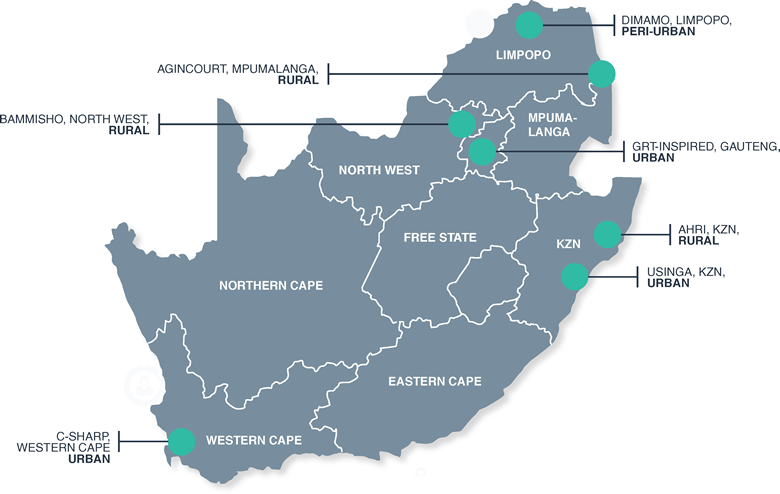South African Population Research Infrastructure Network
The South African Population Research Infrastructure Network (SAPRIN) is a network of public, and academic institutions, and stakeholders in a long-term partnership to produce high quality research. SAPRIN is part of the Department of Science, Technology and Innovation’s (DSTI) strategy to build and strengthen research capacity in the country and forms part of the DSTI’s South African Research Infrastructure Roadmap (SARIR). SAPRIN is hosted within the South African Medical Research Council (SAMRC). SAPRIN has four rural Health and Demographic Surveillance Sites (HDSS), or nodes located in Bushbuckridge, Mpumalanga (Agincourt), Polokwane, Limpopo (DIMAMO), Mtubatuba, northern KwaZulu-Natal (AHRI) and Bojanala district in North West (BAMMISHO). There are three urban HDSSs located in the Western Cape (C-SHARP located in Bishop Lavis and Nomzamo in the Cape Town City Metro), Gauteng (GRT-INSPIRED located in Hillbrow, Atteridgeville and Melusi), and KwaZulu-Natal (USINGA located in Umlazi, eThekwini). Each node has a minimum population of 100 000 people. Each HDSS node aims to have a minimum population of 100,000 people, with a total of over 700,000 individuals and 140,000 geolocated households across the seven nodes.
The network endeavours to produce accessible, dynamic, and timely coordinated and collaborative population-based health and demographic data. SAPRIN has a standardised surveillance questionnaire which collects data from all the nodes across the network. Data is collected from the households in person once per annum and twice per annum via telephone. The data from the surveillance sites can provide current, representative, longitudinal data of South Africa’s disparate communities. It further offers an opportunity to aid in calibrating national datasets such as those from Statistics South Africa. National civil registration systems, health facility data, electronic medical records, labour, and educational outcomes can also be linked to the longitudinal geolocated surveillance data.
A strength of the network is that it allows for studies to be embedded within the network. This allows investigating e.g., the co-occurrence of chronic diseases such as hypertension, diabetes, cardiovascular disease, mental health, and substance abuse. This provides important insights when trying to understand multi-morbidity disease patterns. The research platform brings together various institutions, sectors and researchers which allow for transdisciplinary cross-pollination of ideas, and an exchange of knowledge and expertise. The network provides a platform that allows researchers from various South African, African, and international universities and research institutions to collaborate. This further provides opportunities for honing the skills of local scientists and to grow the base of the next generation of scientists.
The platform streamlines the research process in that it reduces the cost for conducting research. This produces an evidence base that can produce accurate cost-efficient information for data-driven decision making. This ultimately yields improved programme delivery and health outcomes for the poorest South Africans.
Community engagement is a strong component of the SAPRIN strategy. The nodes have and continue to build strong rapport with the communities they are located within. This strength is leveraged on to help co-create the science within these communities. This forged important relationships with communities which has resulted in strong buy in from the communities. This asset can aid to understand health challenges and together develop intervention strategies that will change health outcomes in a positive way.
Overall, SAPRIN is a valuable resource for researchers and policymakers working to improve the health and wellbeing of South African communities. Through its focus on collaboration, partnership, and ethical research practices, SAPRIN is helping to build a more robust and responsive research infrastructure in South Africa, and to support evidence-based decision-making and policy development.
Visit the SAPRIN website


